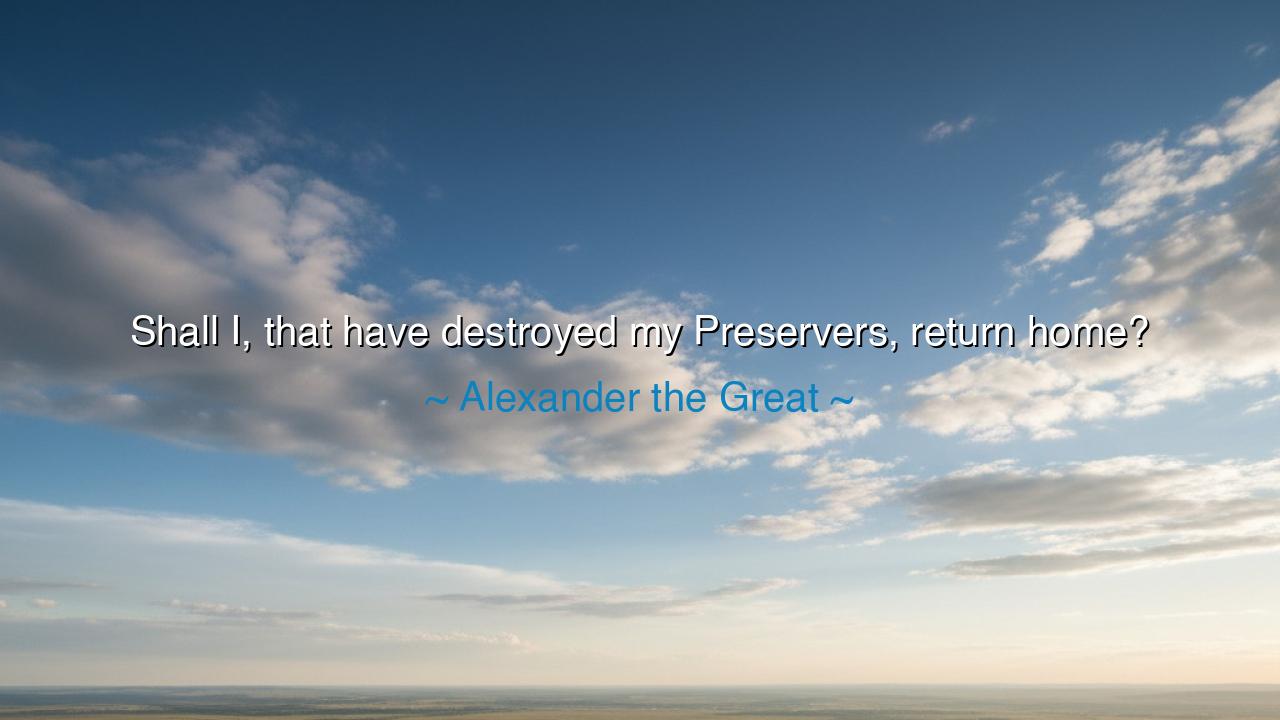
Shall I, that have destroyed my Preservers, return home?






In the haunting and immortal words of Alexander the Great, conqueror of empires and master of the ancient world, there rings a sorrow deeper than victory: “Shall I, that have destroyed my Preservers, return home?” These words, simple yet thunderous, carry within them the ache of a man who has reached the summit of power only to find the air there thin and bitter. They reveal not the voice of a triumphant general, but of a haunted soul, torn by remorse and estranged from peace. Alexander’s lament is not about enemies vanquished or lands subdued—it is about the moral weight of conquest, the cost of glory measured in the lives of those who once sustained him.
Alexander III of Macedon, known to the ages as Alexander the Great, uttered these words near the twilight of his campaigns, after the death of his most trusted general and companion, Cleitus the Black. Cleitus had once saved Alexander’s life at the Battle of Granicus, striking down an enemy who would have ended the young king’s ascent before it began. Yet in a drunken rage years later, during a heated quarrel, Alexander struck Cleitus down with his own hand. When the fire of anger cooled, horror descended upon him. It was then, standing over the body of his friend, that he cried out in anguish, “Shall I, that have destroyed my Preservers, return home?”—a cry not of a king, but of a man shattered by guilt.
In that moment, the conqueror of nations became the captive of his conscience. His victory over Persia, his mastery over Babylon and India—none could console him for the single act that had slain his own savior. The weight of the crown turned to iron upon his brow, and the vastness of his empire became a wilderness of solitude. For Alexander understood then what few kings ever admit: that no man can rule the world if he cannot rule himself. His words are an eternal echo of that truth—that the greatest defeats are those inflicted by one’s own hand.
This tragedy mirrors a pattern seen across the tapestry of human history. Julius Caesar, too, was slain by those he called friends—yet long before his death, he had already wounded the very republic that had preserved him. Napoleon Bonaparte, another world-shaper, rose from revolution’s promise only to crush liberty beneath his ambition. Like Alexander, these men learned that the price of unbridled power is the betrayal of one’s origins, that to “destroy one’s preservers” is to sever the very roots of one’s strength. For what sustains greatness is not conquest, but loyalty; not domination, but the trust of those who believe in the vision of their leader.
In Alexander’s remorse, we glimpse the eternal conflict between glory and virtue, between ambition and humility. His empire stretched from Greece to India, but his heart—once guided by noble ideals—had become a battlefield where pride and repentance clashed. It is easy for men to conquer cities, to command armies, to win adoration; it is far harder to master the tempest within. The ancients taught that hubris—excessive pride—was the seed of ruin. And so it was with Alexander: the very fire that made him a god among men also consumed his peace. His question, “Shall I return home?” was not about geography—it was the cry of a spirit asking whether one can ever return to innocence after the stain of blood and pride.
Yet even in his torment, there is wisdom for us who live long after his time. For every person, in their own way, faces moments when they harm what they love, when they wound the very sources of their strength—be it family, faith, or friendship. In those moments, the heart may whisper as Alexander did: “How can I return?” The answer lies not in denial, but in repentance and remembrance. The past cannot be undone, but its lessons can be carried forward. True greatness is not in never erring, but in having the courage to confront one’s own faults and rebuild what has been broken.
So, my children of the living world, take heed from Alexander’s sorrow. Let not your ambition outrun your compassion, nor your pride blind you to gratitude. Remember those who preserved you—your parents, teachers, comrades, and friends—for they are the pillars of your triumphs. Guard your heart against the poison of arrogance, for even the mightiest fall when they forget the hands that lifted them. And if, in your journey, you too falter and destroy what once sustained you, do not despair—seek forgiveness, restore what can be restored, and let humility become your homecoming.
Thus, in the lament of Alexander the Great, the conqueror becomes the teacher. His cry—“Shall I, that have destroyed my Preservers, return home?”—is a mirror for every soul that has strayed from gratitude and love. It reminds us that true victory lies not in ruling nations, but in governing the heart, not in seizing power, but in preserving the good that first gave life meaning. For the path back home is not found by conquest, but by contrition—and only those who kneel before the truth can rise again in peace.






AAdministratorAdministrator
Welcome, honored guests. Please leave a comment, we will respond soon